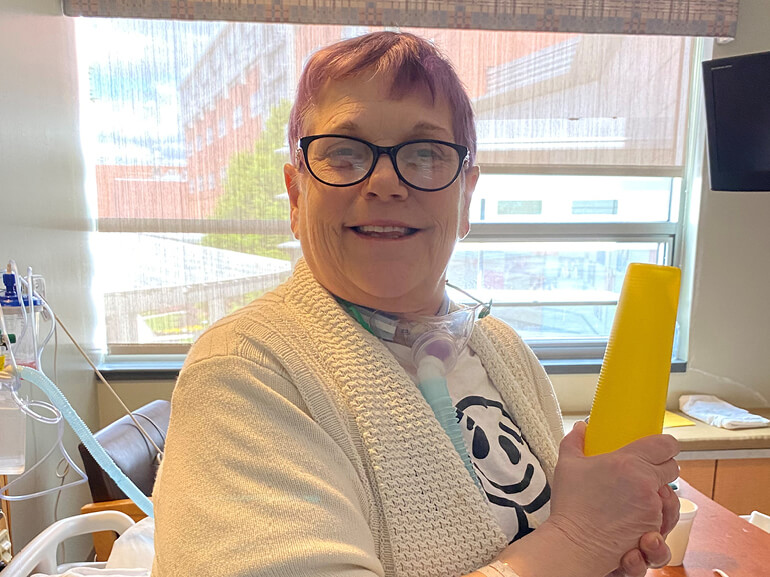Laurie's story

Laurie Gerow, a 58-year-old mother of four and grandmother of eleven, always faced life's challenges head-on. With a 35-year career as a nursing assistant behind her, Laurie knew the value of perseverance and resilience, and she drew on that strength during her own journey at Helen M. Simpson Rehabilitation Hospital.
Laurie's health took a drastic turn when she was diagnosed with severe chronic obstructive pulmonary disease, or COPD, a group of diseases that cause airflow blockage and breathing-related problems. A battle with the flu left her on a ventilator, and she even faced a life-threatening moment when her heart momentarily stopped beating.
Her health was at such a risk, Laurie was placed on the lung transplant list. In the meantime, to facilitate her breathing, Laurie received a tracheostomy, a procedure that created in opening in her windpipe.
Her initial stay at Helen M. Simpson Rehabilitation Hospital following the procedure spanned thirteen days, at which point she was discharged, transitioning to home health therapy and later outpatient therapy. Over time, she made remarkable progress, eventually regaining her independence and bidding farewell to her walker.
However, still waiting for her lung transplant, Laurie's health took a turn for the worse. Struggling to catch her breath and wheezing, she found herself hospitalized at UPMC West Shore. After a brief return home, she knew she needed more than home care.
Laurie, who cherished her role as a grandmother, feared she might inadvertently fall on one of her young grandchildren due to her weakened state. Recognizing the need for inpatient rehabilitation, she made the decision to return to Helen M. Simpson Rehabilitation Hospital.
Upon her readmission, the team noted that Laurie's mobility was significantly impaired. She required moderate assistance for walking and assistance with lower body dressing. Standing on her own seemed impossible.
In the face of a persistent infection, Laurie's therapists adjusted their approach, conducting much of her physical and occupational therapy in her room. Physical therapy sessions included exercises to improve her ability to rise from her bed and different chairs, as well as practice sessions navigating an in-room makeshift curb. Laurie fondly remembers her physical therapist as a constant motivator, even when the challenges seemed insurmountable.
Occupational therapy focused on Laurie's independence in dressing and bathing. One significant breakthrough was her ability to maneuver her walker without becoming entangled in her oxygen hose. Laurie recalls, "Before, I was always getting tangled up in my oxygen hose, even at home. That was my ah-ha moment—learning how to turn without being wrapped up in tubing."
Laurie's resilience and the support of her physician-led team pushed her forward. Despite the grueling work, Laurie remained steadfast in her commitment to recovery, knowing that her new lungs were within reach. She shared her post-transplant dreams, including camping adventures with her older grandchildren and exploring unique places with her younger ones.
Laurie emphasized the impact her therapists and the Helen Simpson Rehabilitation Hospital staff had on her life.
She reflected, "The therapists taught me so much here. I am going to keep doing everything that they told me to do. The people here are so good to me. It is like I am family. The staff at Helen M. Simpson helped me to see that I am worthy and gave me that chance to get better."